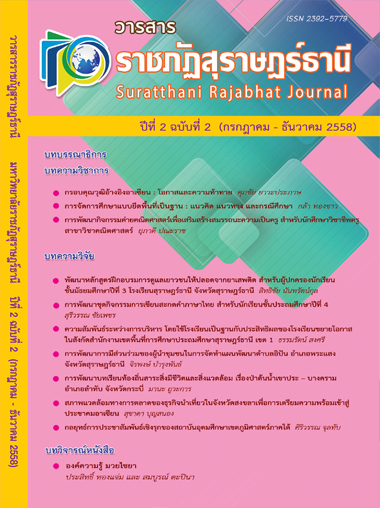DEVELOPMENT OF MATHEMATICS CAMP TO ENHANCE PRE - SERVICE TEACHERS’ COMPETENCY IN MATHEMATICS PROGRAM
Main Article Content
Abstract
Development of Mathematics Camp can be conducted in three stages : Action planning stage ; to prepare and design the activities, Implementation stage ; to employ the Mathematics Camp activities with the students, and Evaluation stage ; to consider reaction, learning, behavior and result. The Mathematics Camp activities can improve both pre-service teachers and students ‘competency and performance in mathematics and desirable characteristics. The pre - service teachers in Mathematics program will develop the intellectual skill. They can bring their knowledge used to manage learning and develop student. The interpersonal skill and responsibility, they can practice to perception and empathy in listen with primary and secondary students who learn mathematics. The last is learning management skill, they can learn how to manage learning in many ways creatively. For the students who attend in Mathematics Camp, the will get the mathematical knowledge, mathematical process and skills, science skills, and the important of desirable characteristics such as teamwork, learning to live together, leadership and followership, adaptation, helping each other, discipline, sacrifice, patience, punctuality, and good attitude toward mathematics. This can be applied in the classroom and in everyday life.
Article Details
References
เชาว์ อินใย. (2553). การประเมินโครงการ. กรุงเทพฯ : วี.พริ้นท์ (1991).
ดาวรุวรรณ ถวิลการ. (2548). ผลของการใช้กิจกรรมค่ายคณิตศาสตร์ เพื่อพัฒนาผลสัมฤทธิ์ทางการเรียนวิชาคณิตศาสตร์ และความฉลาดทางอารมณ์ ด้านการจูงใจตนเองของนักเรียนชั้นมัธยมศึกษาปีที่ 6 โรงเรียนคำม่วง จังหวัดกาฬสินธุ์. ปริญญานิพนธ์การศีกษามหาบัณฑิต สาขาวิชาการวิจัยและสถิติทางการศึกษา บัณฑิตวิทยาลัย มหาวิทยาลัยศรีนครินทรวิโรฒ.
ทวีป ศิริรัศมี. (2545). การวางแผนพัฒนาและประเมินโครงการ (พิมพ์ครั้งที่ 3). กรุงเทพฯ : สำนักงานกองทุนสนับสนุนการวิจัย (สกว.)
ผ่องพรรณ ตรัยมงคลกูล และสุภาพ ฉัตราภรณ์. (2544). การออกแบบการวิจัย. กรุงเทพฯ : มหาวิทยาลัยเกษตรศาสตร์.
พิสณุ ฟองศรี. (2553). การประเมินโครงการฝึกอบรม. กรุงเทพฯ : ด่านสุทธาการพิมพ์.
ยุภาดี ปณะราช และอุไรวรรณ ศรีไชยมูล. (2556ก). “การจัดกิจกรรมคณิตศาสตร์เพื่อส่งเสริมทักษะการสื่อสารทางคณิตศาสตร์”, นำเสนอใน การประชุมวิชาการทางคณิตศาสตร์ประจำปี 2556 (ครั้งที่ 18) : Preceeding of The 18th Annual Meeting in Mathematics (AMM2013). 14 – 16 มีนาคม 2556. ณ มหาวิทยาลัยทักษิณ จังหวัดกระบี่.
-----------. (2556ข). “การเสริมสร้างทักษะการแก้ปัญหาทางคณิตศาสตร์โดยใช้กิจกรรมค่ายคณิตศาสตร์”, นำเสนอใน การประชุมนำเสนอผลงานวิจัยระดับบัณฑิตศึกษา ครั้งที่ 7 ปีการศึกษา 2556. 1 – 2 พฤศจิกายน 2556. ณ มหาวิทยาลัยราชภัฏอุดรธานี จังหวัดอุดรธานี.
เยาวดี รางชัยกุล วิบูลย์ศรี. (2546). การประเมินโครงการ : แนวคิดและแนวปฏิบัติ (พิมพ์ครั้งที่ 3). กรุงเทพฯ : จุฬาลงกรณ์มหาวิทยาลัย.
สถาบันส่งเสริมการสอนวิทยาศาสตร์และเทคโนโลยี. (2554). คู่มือการจัดค่ายคณิตศาสตร์ ระดับมัธยมศึกษา. กรุงเทพฯ : วัชรินทร์ พี.พี.
สมคิด พรหมจุ้ย. (2550). เทคนิคการประเมินโครงการ (พิมพ์ครั้งที่ 5). นนทบุรี : จตุพร ดีไซน์.
สมวงษ์ แปลงประสพโชค และคณะ. (2551). ค่ายคณิตศาสตร์ (พิมพ์ครั้งที่ 3). กรุงเทพฯ : มหาวิทยาลัยราชภัฏพระนคร.
สมหวัง พิริยานุวัฒน์. (2545). รวมบทความทางการประเมินโครงการ. กรุงเทพฯ : จุฬาลงกรณ์มหาวิทยาลัย.
สำนักงานคณะกรรมการการศึกษาขั้นพื้นฐาน. (2552). หลักสูตรแกนกลางการศึกษา ขั้นพื้นฐาน พุทธศักราช 2551. กรุงเทพฯ : โรงพิมพ์ชุมนุมสหกรณ์การเกษตรแห่งประเทศไทย
สำนักนายกรัฐมนตรี. (2552). พระราชบัญญัติการศึกษาแห่งชาติ พ.ศ. 2542. กรุงเทพฯ : องค์การรับส่งสินค้าและพัสดุภัณฑ์ (ร.ส.พ.).
สำนักมาตรฐานและคุณภาพอุดมศึกษา, สำนักงานคณะกรรมการการอุดมศึกษา. (2557). คู่มือการประกันคุณภาพการศึกษาภายใน ระดับอุดมศึกษา ฉบับปีการศึกษา 2557 (Online). สืบค้นจาก : http://www.mua.go.th/users/bhes/ DATA%20BHES2558/upload%20file%20IQA/iqa%20manual2557.pdf.
สำนักวิชาการและมาตรฐานการศึกษา, สำนักงานคณะกรรมการการศึกษาขั้นพื้นฐาน. (2553). แนวทางการจัดกิจกรรมพัฒนาผู้เรียน ตามหลักสูตรแกนกลางการศึกษาขั้นพื้นฐาน พุทธศักราช 2551 (พิมพ์ครั้งที่ 2). กรุงเทพฯ : ชุมนุมสหกรณ์การเกษตรแห่งประเทศไทย.
องอาจ นัยพัฒน์. (2551). การออกแบบการวิจัย: วิธีการเชิงปริมาณ เชิงคุณภาพ และผสมผสานวิธีการ. กรุงเทพฯ : โรงพิมพ์แห่งจุฬาลงกรณ์มหาวิทยาลัย.
Baskerville, R. L. (1999). “Investigation Information Systemation with Action Research”, Communication of the Association for Information Systems. 2 (19).
Elliot, J. (1991). Action Research for Educational Change. Philadelphia : Open University Press.
Kemmis, S. and McTaggart, R. (1988). The Action Research Planner. Geelong, Victoria : Deakin University Press.
Kitkpatrick, J. and Kitkpatrick, W. K. (2009). The Kirkpatrick Four Level : A Fresh Look After 50 Years 1959 - 2009. Retrieved from : http://www.managesmarter.com/managesmarter/images/pdfs /trg_20090417_kirkpatrickwhitepaper.pdf.
Lewin, K. (1946). “Action Research and Minority Problem”, Journal of Sociology. 2(4). p. 34 - 46.
Machit, S. (2004). Math camp : a non-traditional fieldwork experience for the pre - service teacher. (M.A. Interdisciplinary Studies). CA : California State University. Retrieved April, 2, 2010, from ProQuest Dissertation & Theses databases. (UMI number : 1423210)
Mckerman, J. (1996). Curriculum Action Research. 2nd ed. London : Kogan Page.
Panarach, Y. (2011). “Pattern development for Mathematics Camp by action research” in Laos Journal on Applied Science. Vol 2. No. 1. March 2011. p. 453 - 458.
Panarach, Y. and Srichaimool, U. (2013). “The Mathematics Camp activities to promote mathematical reasoning skills” paper presented at the Fifth International conference on Science and Mathematics Education (CoSMEd 2013). 11 – 14 November 2013. Penang, Malaysia.
-----------. (2014). “Development Mathematics Camp activities to enhance mathematical creativity skills” paper presented at the Global research conference across disciplines : Crossing borders through research. 13 – 15 August 2014. Iloilo city, Philippines.
Stringer, E. T. (1999). Action Research. Thousand Oaks, CA : Sage Pubblications.
Stufflebeam, D. L. (1971). Action Research for Educational Change. Philadelphia : Open University Press.


